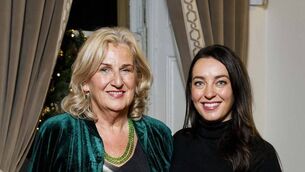Vodafone CEO says developing digital infrastructure 'prerequisite' for Irish competitiveness

Cork Chamber CEO Conor Healy; guest speaker, Vodafone Ireland CEO Sabrina Casalta; Irish Examiner managing director Karen O'Donoghue; Cork Chamber president Rob Horgan, RDJ LLP partner Ashling Walsh at the Chamber Business Breakfast held at Páirc Uí Chaoimh on Tuesday. Picture: David Creedon
Developing Ireland’s digital communications infrastructure is a "prerequisite" if Ireland is to maintain future global competitiveness, the chief executive of Vodafone Ireland told business leaders on Tuesday.
Vodafone Ireland chief executive Sabrina Casalta was speaking at a packed Cork Chamber Business Breakfast at Páirc Uí Chaoimh. Ms Casalta was appointed in May as the company’s CEO of Irish operations, having previously served as the interim CEO and chief financial officer of Vodafone Italy.












